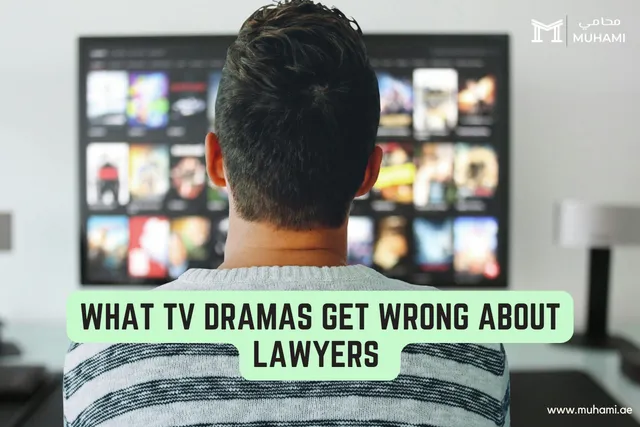What TV Dramas Get Wrong About Lawyers

The jury files in, tension thick in the air. A defense attorney rises, delivering a fiery closing argument that lasts barely five minutes. The jury nods, visibly swayed. Moments later, the foreperson announces: “Not guilty.” The attorney smirks, the client bursts into tears, and justice is served, in less than an hour of television.
For anyone who has actually set foot in a courtroom, this scene feels more like fantasy than fact. Legal dramas, from Suits to Law & Order to How to Get Away with Murder, have built an entire genre on the back of suspenseful trials, clever cross-examinations, and glamorous lawyers who solve impossible cases overnight. But while entertaining, these portrayals rarely resemble the true practice of law.
The Myth of the Instant Trial
Television thrives on speed. A client is arrested, evidence discovered, and trial concluded, all within a single episode. In reality, cases move at a crawl. Pretrial motions, discovery disputes, and procedural wrangling can stretch on for months or even years before a case ever reaches a jury.
For example, in complex civil litigation, discovery alone, the exchange of documents, depositions, and interrogatories—can last longer than the entire runtime of a TV series season. Even criminal cases, where constitutional rights demand swifter action, often involve continuances, plea negotiations, and evidentiary hearings that push trial dates far into the future.
The reality: lawyers spend more time waiting for court dates and combing through records than delivering impassioned speeches to juries.
The Glamour vs. The Grind
Hollywood lawyers stride through glass offices in designer suits, trading witty banter while sipping cocktails at chic bars. The reality is far less glamorous. Entry-level associates often spend late nights drafting motions, reviewing contracts, or analyzing case law. Litigation rarely involves back-to-back dramatic confrontations. Instead, much of it is tedious research, client meetings, and paperwork.
Consider law school itself: Suits makes it seem like a playground for prodigies who can bluff their way through. In truth, legal education is grueling. Success depends not on quick comebacks but on hours of reading, mastering dry statutory frameworks, and learning to parse precedent with surgical precision. Law students don’t spend evenings plotting elaborate schemes in dimly lit libraries, they’re usually outlining, briefing cases, or simply trying to stay afloat.
The reality: the day-to-day work of a lawyer is far more about diligence and preparation than charisma.
The Courtroom as Stage: Not Reality
On television, courtroom drama unfolds like theatre: a surprise witness barges in, a lawyer delivers a devastating “gotcha” question, and the truth is revealed in seconds. In real life, the rules of evidence make such theatrics nearly impossible.
-
Surprise witnesses? They don’t exist. Both sides must disclose witnesses and evidence during discovery. Springing new testimony without prior notice would almost certainly be barred.
-
Dramatic cross-examinations? Effective, yesbut usually focused on consistency, credibility, and detail. Rarely do they culminate in a witness breaking down and confessing on the stand.
-
Closing arguments? Often lengthy, carefully structured, and far less cinematic than their TV counterparts.
In short, trials aren’t scripted performances; they’re governed by rules designed to avoid surprises and keep proceedings fair.
The Misconception of the Lone Genius
Shows like Boston Legal and Suits celebrate the “brilliant maverick”, the lone attorney who bends rules, trusts instinct, and wins cases on sheer personality. While entertaining, this depiction ignores the collaborative nature of real legal practice.
Behind every trial lawyer stands a team: paralegals managing documents, associates drafting motions, clerks researching case law, and experts preparing testimony. Even the sharpest courtroom advocate relies on a support system.
Moreover, in actual practice, bending rules has consequences. Misrepresenting facts or misleading the court risks sanctions, disciplinary action, or even disbarment. Lawyers can’t simply rely on “gut feelings” or flair; their arguments must be grounded in evidence and law.
The reality: law is rarely a solo sport. Success depends on teamwork, ethics, and meticulous preparation.
The Overemphasis on Trials
Perhaps the biggest distortion is the focus on trials themselves. On TV, every dispute seems destined for a climactic courtroom showdown. In reality, the vast majority of cases never reach trial.
-
In the U.S., over 90% of civil cases settle before trial.
-
Roughly 95% of criminal cases are resolved through plea bargains.
This means most lawyers spend their time negotiating settlements, drafting agreements, or guiding clients through alternatives like mediation and arbitration. Trials, while high-stakes and dramatic, are rare events.
The reality: lawyers are more often negotiators and advisors than courtroom warriors.
The Emotional Toll: Rarely Shown
Television often romanticizes lawyers as cool, unflappable professionals. But real-world practice involves tremendous emotional strain. Defense attorneys may carry the burden of representing unpopular clients. Family lawyers confront the raw heartbreak of custody battles. Prosecutors face pressure to balance justice with fairness.
Clients aren’t scripted characters, they’re people whose lives are deeply affected by outcomes. Managing those human dimensions, offering empathy while staying professional, is one of the hardest parts of the job.
The reality: law is not just intellectually demanding, it is emotionally taxing.
What TV Gets Right (Sometimes)
Not everything is pure fiction. Many legal dramas capture certain truths:
-
The adversarial nature of litigation, the back-and-forth between opposing sides.
-
The importance of preparation, though sped up for screen, shows occasionally highlight research and strategy.
-
The intensity of trial work , though rare, when cases go to court, the stakes are as high as portrayed.
These glimmers of accuracy help explain why the genre remains so compelling.
Why These Misconceptions Matter
At first glance, one might argue that inaccurate portrayals are harmless, just entertainment. But these misconceptions carry real consequences:
-
Clients’ expectations: Some arrive expecting dramatic courtroom battles when their case is more likely to be resolved through paperwork and negotiation.
-
Law students’ motivations: Many enter law school inspired by TV depictions, only to confront a much drier and slower reality.
-
Public perception: Misunderstanding how justice actually works can breed cynicism or unrealistic trust in the system.
By peeling back the curtain, lawyers can help clients and the public develop a more grounded understanding of legal practice.
Conclusion: Reality Over Romance
Television thrives on drama, and the law provides fertile ground. But real legal work is more marathon than sprint, more preparation than performance. The lawyer’s world is not built on surprise witnesses and five-minute closing arguments, but on diligence, precision, and ethical responsibility.
That may not make for binge-worthy television, but it makes for a justice system that works, imperfectly, slowly, but with far more integrity than the silver screen suggests.
In the end, the difference between Hollywood and the courtroom is this: TV is about the story; law is about the truth.
Any Questions?
Connect with lawyers and seek expert legal advice
Share
Find by Article Category
Browse articles by categories
Featured Partnership
She Knows Best
Anonymous Advice, For Women By Women
Related Articles

Cash locked in VAT is cash you cannot u…
A practical guide to reclaiming VAT on commercial real estate in the UAE Two…

Cash locked in VAT is cash you cannot use to run …
A practical guide to reclaiming VAT on commercial…

Why FIDIC Red Book Contracts Must Be Am…
Introduction For Owners and Contractors in the UAE, the unamended FIDIC Red …

Why FIDIC Red Book Contracts Must Be Amended Befo…
Introduction For Owners and Contractors in the…

ADGM’s Substantial Public Interest Fram…
The Abu Dhabi Global Market (ADGM) has introduced new Data Protection Regulatio…

ADGM’s Substantial Public Interest Framework: Sha…
The Abu Dhabi Global Market (ADGM) has introduced…
